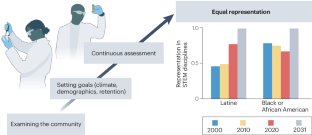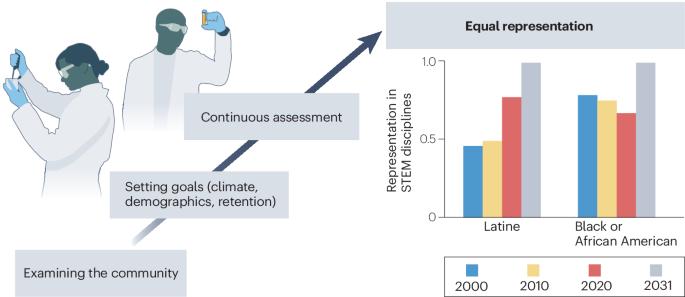Framework for department-level accountability to diversify engineering
IF 37.6
引用次数: 0
Abstract
Diverse teams are more innovative and creative. Nevertheless, science, technology, engineering and mathematics disciplines, including bioengineering, continue to fall short in increasing representation from persons from groups historically excluded because of their ethnicity or race. Many universities have crafted strategic plans to increase diversity; however, university-wide policies often fail to result in notable changes in microcommunities, such as departments and undergraduate or graduate programs. Therefore, departments may benefit from guidelines not only to craft effective diversity, equity and inclusion (DEI) plans, but also to measure progress towards achieving specific DEI goals. In this Perspective, we present a framework for building, assessing and continuously improving strategic plans to improve recruitment and retention and to make departments more inclusive, including the collection of demographic data, the establishment and assessment of DEI plans, specific goal setting and assessment of achievements, with specific examples and guidelines, which will ultimately help departments to become inclusive working environments. University departments may benefit from guidelines not only to craft effective diversity, equity and inclusion plans, but also to measure progress towards achieving specific goals. This Perspective presents a framework for building, assessing and continuously improving strategic plans to improve recruitment and retention and make departments more inclusive.


工程学多样化的部级问责制框架
多元化的团队更具创新性和创造力。然而,包括生物工程在内的科学、技术、工程和数学学科在增加历史上因民族或种族而被排斥的群体的代表性方面仍然存在不足。许多大学都制定了旨在提高多样性的战略计划;然而,全校性的政策往往无法给微观社区(如院系、本科生或研究生项目)带来显著的变化。因此,各院系可能会从指导方针中获益,不仅能制定有效的多元化、公平与包容(DEI)计划,还能衡量实现特定 DEI 目标的进展情况。在本《视角》中,我们提出了一个框架,用于建立、评估和不断改进战略计划,以改善招生和留用情况,使各院系更具包容性,包括收集人口数据、建立和评估多元化、公平与包容(DEI)计划、制定具体目标和评估成就,并附有具体实例和指导原则,最终帮助各院系成为具有包容性的工作环境。大学各院系可以从指导方针中获益,不仅可以制定有效的多元化、公平和全纳计划,还可以衡量在实现具体目标方面取得的进展。本视角为制定、评估和不断改进战略计划提供了一个框架,以改进招聘和留用工作,使各院系更具包容性。
本文章由计算机程序翻译,如有差异,请以英文原文为准。
求助全文
约1分钟内获得全文
求助全文

 求助内容:
求助内容: 应助结果提醒方式:
应助结果提醒方式:


